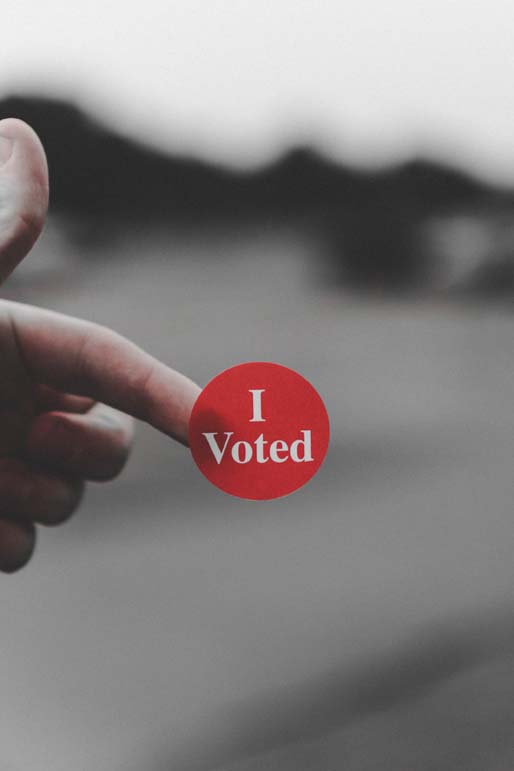
Abolishing the electoral college would indeed be one way of instituting a popular presidential vote, but there's already an initiative underway that could bring about the same result without the hassle of a constitutional amendment: the National Popular Vote interstate compact.
It works like this: States agree to allocate their electoral votes to the candidate who wins the national popular vote. The compact wouldn't kick in until states with at least 270 electoral college votes among them - the threshold required to elect a president - have signed on.
Say, for instance, California is a member of the compact. If President Donald Trump were to win the popular vote in 2020, the longtime blue state would award him all 55 of its electoral votes, regardless of how he fared on the state ballot.
Conversely, if Texas was in the compact and a Democrat captured the national vote in 2020, then a state that's voted Republican in the last 10 presidential races would give all 38 of its electoral votes to the blue candidate, again regardless of the local outcome.
Think of it as an end-run around the electoral college: The mechanism remains in place, but the allocation of electoral votes defaults to the candidate who collects the most actual votes across the country.
Many Democrats, including Warren, disparaged the electoral college following the presidential election results in 2000 and 2016, when Al Gore and Hillary Clinton each won the national popular vote, yet lost in the electoral college and, as a result, the presidency. All told, five of the nation's 45 presidents have taken office without winning the national popular vote.
Supporters say the change would open the national electoral map, requiring candidates to campaign everywhere, rather than just in, say, a small handful of battleground states. And they've already made headway in making their vision a reality: as of this month, legislatures in 14 states plus the District of Columbia have pledged to join the compact. They represent 189 electoral votes, meaning they need 81 more to put the compact in action.
How might they get there?
Thee compact initiative could reach 270 with just three more states - Texas, Florida and Pennsylvania. The problem for organizers, though, is that battleground states like Florida and Pennsylvania have little incentive to join the compact - they like having all the attention and political ad dollars that election years bring.
So organizers of the national popular vote have turned to what founder John Koza calls "jilted battlegrounds" - states that used to be major battlegrounds, he explained in an interview, but which have since turned from purple to red or blue.
Colorado, where Gov. Jared Polis just signed legislation to join the compact, is among those states. So is New Mexico, where a bill passed by the legislature awaits the governor's signature.
Meanwhile, lawmakers in 15 other states have introduced pro-compact legislation. If the bills pass in just five of those states - Florida, Ohio, Georgia, North Carolina and Indiana - the plan would hit its 270-vote target.
Voters in some states could also opt to bypass their legislatures entirely and attempt to join the compact via a voter-initiated ballot measure. Koza said that hasn't happened yet, and it's unclear whether the Supreme Court would even allow it. But he says his group is "very interested" in the idea.
"We thought as we got closer to 270 there would be increasing public interest, and maybe we could get it [on the ballot] in some states where it was bogged down in the legislature," he said.
Polling shows that electing presidents by popular vote is widely favored among the public, at least in theory. A 2018 Atlantic/PRRI survey found, for instance, that "nearly two-thirds (65%) of Americans believe that presidential elections should be decided based on the national popular vote." A separate and more specific Pew Research Center survey that year found that 55 percent expressed support for amending the Constitution to allow the president to be elected by the popular vote.
Koza says that partisan reactions to his national popular vote idea tend to shift depending on who's in the White House.
"In 2006, when George W. Bush was in the White House, it was quite hard to get Republicans interested. Then after [Barack] Obama won we encountered a lot of difficulties with Democratic legislatures." Now, he says, with Trump in office Republicans are skeptical again.
"Each of the parties goes into this triumphal mode after they win the last election and imagine that the system is rigged in their favor because they just won," he says. "Then often, times change."
(COMMENT, BELOW)
Every weekday JewishWorldReview.com publishes what many in the media and Washington consider "must-reading". Sign up for the daily JWR update. It's free. Just click here.


 Contact The Editor
Contact The Editor
 Articles By This Author
Articles By This Author